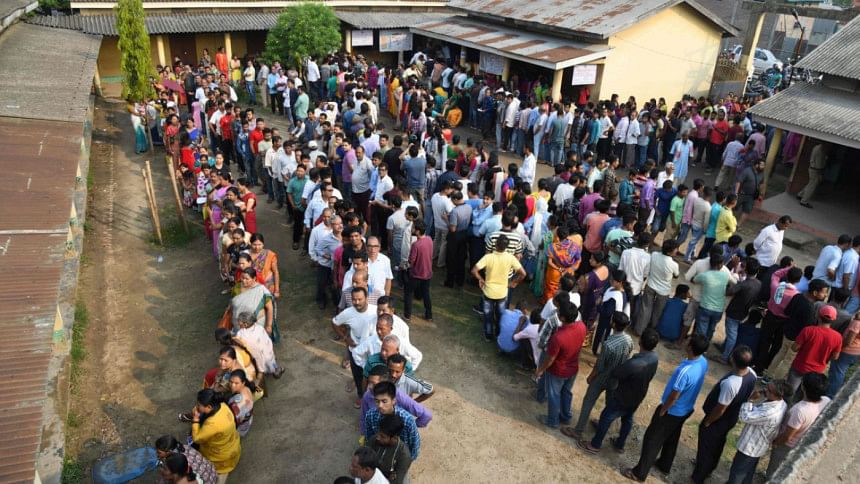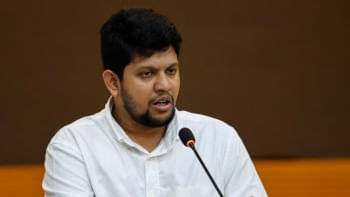Numbers game begins as India braces for poll verdict

With Indian parliamentary election having entered the final lap of voting before vote-count is taken up in about a fortnight (on May 23), coalition-building efforts have begun afresh amidst indications of majority being elusive for any particular party or pre-poll alliance of parties. The players on the opposite sides of the political divide are looking for new allies to shore up the numbers keeping in a possible fractured electoral mandate.
The first hint from the Bharatiya Janata Party about the possibility of it failing to secure majority came last week when the party General Secretary Ram Madhav was quoted by Bloomberg news agency as saying that, "we will be happy with 271 (out of total of 543) Lok Sabha seats and depend on allies for the majority." A few days later, Sanjay Raut, the spokesman of the BJP's oldest Hindutva ally Shiv Sena, endorsed Madhav's assessment. This set the stage for the BJP, the Congress and top leaders of two key regional parties from the South—Chief Minister K Chandrasekhara Rao of Telangana Rashtra Samiti (TRS) and his next-door neighbour Andhra Pradesh Chief Minister N Chandrababu Naidu—reaching out to new potential allies in the post-poll scenario.
Prime Minister Narendra Modi was the first off the blocks when he undertook an aerial survey of the areas in Odisha state, which was badly hit by the recent extremely severe cyclonic storm "Fani," and promptly loosened his government's purse strings announcing a financial assistance of Rs 1,000 crore. Odisha has been ruled for the last 15 years by the Biju Janata Dal (BJD) led by Chief Minister Naveen Patnaik whose party is not a part of either the BJP-led National Democratic Alliance (NDA) or the Congress-spearheaded United Progressive Alliance (UPA). The expectation is the BJD will walk away with a majority of the 21 parliamentary seats in the state despite a spirited challenge from the BJP against Patnaik's party.
The BJD and the BJP may be rivals in Odisha politics for long but that has not prevented the former at times rallying behind the Modi government in the last five years on a number of occasions. Pragmatic Patnaik is an astute politician. During his visit to Odisha post-Fani, Modi went public with his praise for the Patnaik government's handling of the preparations for the cyclone and of the situation afterwards. This was followed by the Modi government declaring cyclone Fani as an "extremely severe natural calamity".
At the other end of the spectrum are top leaders of two key regional parties of the South—K Chandrasekhara Rao, Telangana Chief Minister and Telangana Rashtra Samiti (TRS) chief and his next-door neighbour Andhra Pradesh Chief Minister N Chandrababu Naidu who heads Telugu Desam Party that initiated two parallel moves with the focus on the post-poll scenario. While Rao met Kerala Chief Minister and Marxist leader Pinarayi Vijayan, Naidu travelled first to New Delhi and met Congress President Rahul Gandhi and then to Kolkata where he met West Bengal Chief Minister Mamata Banerjee. Vijayan told the media after his meeting that neither the BJP nor the Congress would get majority and so regional parties will play a crucial role in forming the new government.
The assessment in the opposition camp is that the BJP may emerge as the largest single party and the NDA as the biggest pre-poll alliance bloc—but could fall well short of the majority mark. But there are two important differences between Rao and Naidu. While Rao is known to be not averse to working with the BJP if the situation warrants, Naidu has adopted a strident anti-BJP stance ever since he parted ways with the saffron party in March last year. Secondly, Rao swept the assembly polls in Telangana last year and is firmly in the saddle. But Naidu faces a tough challenge from YSR Congress Party led by Jaganmohan Reddy in the assembly elections held in Andhra Pradesh along with parliamentary elections on April 11 and is not sure about his future in his state. Besides, Naidu as of now believes the Congress will have a crucial say in the next government. The key opposition interlocutors like Mamata, National Conference leader Farooq Abdullah, Nationalist Congress Party Chief Sharad Pawar and Naidu have been in touch with each other from time to time.
On the agenda of the separate meetings, Rao and Naidu reportedly had a proposal to meet President Ram Nath Kovind to impress upon him not to send the first invitation to the largest single party to have a shot at government-formation in the event of a hung parliament. There is apprehension in the opposition camp that if invited first to form government and asked to prove majority on the floor of the Lok Sabha as per the convention, it might get a chance to consolidate its position by luring lawmakers or parties prone to magnetic pull of power.
The opposition parties are conscious of the fact that there has been no national-level tie-up among them in the run up to the election and what is needed is a façade of unity among them post-poll in a bid to mobilise opinion on the issue of who gets the first call to form the new government. In other words, the opposition parties do not want the BJP to get the first-bird advantage. The leaders of 21 opposition parties are planning a joint brainstorming meeting in New Delhi on May 21 just two days before the election results are announced. Their meeting to firm up a strategy for the post-poll situation will have the benefit of exit polls results by media houses which are expected on the evening of May 19 when the final round of the seven-phase of polling concludes.
In the two years in the run up to the election, both Rao and Naidu had a number of meetings with Mamata discussing a non-BJP and non-Congress Front. But Naidu for one has come to realise that such a front keeping out either BJP or the Congress is naïve. Even the only time India had such a non-Congress and non-BJP government in 1996-97, when Naidu was the convener of the United Front coalition, it had the support of the Congress Party. The United Front government did not even last two years.
Pallab Bhattacharya is a special correspondent at The Daily Star.

 For all latest news, follow The Daily Star's Google News channel.
For all latest news, follow The Daily Star's Google News channel. 



Comments